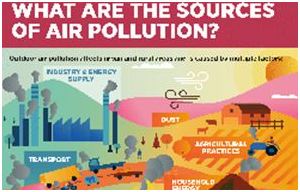Over half a million premature deaths annually in the European Region attributable to household and ambient air pollution
Извор: Светска здравствена организација – 02.05.2018

WHO has updated its air quality database and estimates of the disease burden attributable to air pollution. In the WHO European Region, 556 000 premature deaths were attributable to the joint effects of household and ambient air pollution for 2016.
This is the revised figure from the updated WHO ambient air quality database launched today.
It shows that 348 000 of these deaths in the Region occurred in low- and middle-income countries, and 208 000 deaths occurred in high-income countries. Of these, the majority are attributable to ambient air pollution.
Regarding household air pollution, from 2000 to 2016 the Region was the place where the highest percentage of the population had access to clean fuels and technologies for cooking (over 90%).
Comprehensive global database on air quality
Globally, more than 4300 cities in 108 countries are now included in WHO’s updated ambient air quality database, making this the world’s most comprehensive database on ambient air pollution.
Since 2016, more than 1000 additional cities have been added to WHO’s global database, which shows that more countries are measuring and taking action to reduce air pollution than ever before. The database collects annual mean concentrations of fine particulate matter (PM10 and PM2.5).
Burden of disease twice as high in low- and middle-income countries
The burden of disease attributable to air pollution is not evenly distributed across the Region: 84 deaths per 100 000 population occur in low- and middle-income countries, while 42 deaths per 100 000 population occur in high-income countries. However, the PM10 or PM2.5 annual means increased in more than 10% of cities, both in high-income countries and low- and middle-income countries.
In high-income countries of the Region, around 40% of the assessed population is exposed to PM10 or PM2.5 annual mean levels complying with WHO Air Quality Guideline (AQG) levels. In low- and middle-income countries of the Region, this figure is less than 20%.
Air pollution does not recognize borders. Improving air quality demands sustained and coordinated action at all levels. Countries need to work together on solutions for sustainable transport, more efficient and renewable energy production and use, and waste management.
WHO works with many sectors, including transport and energy, urban planning, and rural development, to provide technical support to countries to tackle this problem, while also continuing its normative work on updating the AQG.
